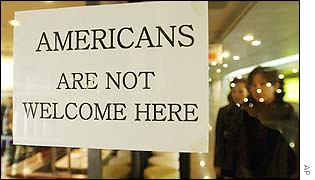Jim Crow Update
The streets of Seoul are no longer safe for foreigners, according to this report (hat tip to Mark):
A local Yahoo-style portal named Daum set up a petition to rid South Korea of “˜low-grade Westerners’. Demonstrations are planned and activists are encouraged to confront Western men who are seen with Korean women. Many foreigners are becoming increasingly worried. Some have already left. The US embassy in Korea has issued a warning urging US citizens to avoid visiting certain parts of Seoul due to fears of reprisals. South Korea is in danger of becoming the most xenophobic and reactionary society in democratic Asia. This contrasts deeply with the stated aim of the Roh administration to become the “˜hub’ of North East Asia ““ a link between China and the Pacific Rim.
Well, I’m just not quite sure what to say. Perhaps blogging has made me suspicious of anything I read that doesn’t have links, but this travel advisory is still on the U.S. Embassy Web site:
Recently, inflammatory sexual content was posted to a website for English language teachers in Korea. That posting together with subsequent postings were taken by some to demean Korean women. We have noted recently, strong reaction in the form of web postings threatening attacks in the vicinity of Hongik University and the Sinchon area against Americans and other foreigners who speak English. All Americans and their families (especially young adults) are encouraged to exercise prudence and caution when visiting these neighborhoods.
But how much of this latest report is true? I wouldn’t doubt a drop in foreign visitors–it certainly doesn’t make me want to take my (Korean) wife back there, not to mention our kids–but where’s the actual evidence that tourism has dropped off? Where are the pictures of the signs, other than the one posted above, and have posted before? If things have gotten this bad, it would represent a significant deterioration from what I observed two and a half years ago (which was bad enough). Some friends have actually told me that things have improved there slightly, but then again, a friend recently reported that he and his young children (who are half-Korean) were recently accosted, surrounded, and cursed by an angry, racist mob right near the U.S. Embassy. In other words, I believe the article has a foundation of truth, but I’m not quite persuaded that matters are much worse than they were three years ago.
I’m also more than a little annoyed that to at least some of the English teachers, racism wasn’t a problem when it was directed toward the soldiers; the matter suddenly became a crisis when civilians and non-Americans became the targets (one commenter actually suggested confining U.S. troops to their bases to keep it real for the teachers and their social lives). Racism was wrong then and it’s wrong now. Indeed, Korean racism–or anyone else’s, for that matter–is just as wrong when it’s directed at ethnic Koreans or Japanese (hat tips to the Marmot).
Either way, the fact that the South Korean government permits national and racial discrimination to go on unmolested, hands out few consequences to those responsible for the violence, does little to discourage this hatred, and even takes advantage of its climate politically almost assures that the voices of bigotry will continue to reach new lows, and that it will eventually have a signficant effect on South Korea’s economy and relations with other nations, if it hasn’t already.
So those of you in Korea, you tell me: how bad have things really gotten?
